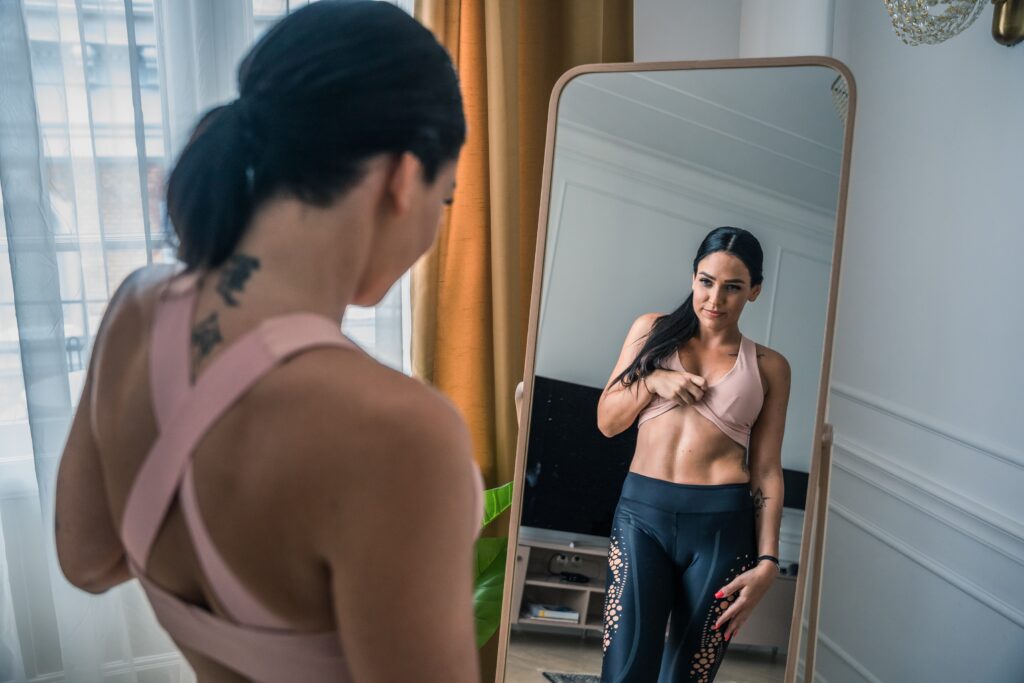
“You can’t hate yourself happy. You can’t criticize yourself thin. You can’t shame yourself worthy. Real change begins with self-love and self-care.” — Jessica Ortner
Every day we see pictures of what the “perfect” man or woman *should* look like. While we may think these are just images that we view and move on, the truth is that we actually absorb this idea and unknowingly subscribe to what the “perfect” body looks like. The ideal man has a six pack and pronounced jaw line; the perfect woman has an hourglass shape (complete with a thigh gap) and exceptionally beautiful beachy waves. Desirable features like these (or the lack thereof) are part of what is known as body image. I want to talk about what creates negative body image and how we can overcome it.
Simply defined, body image is how we see ourselves when we look in the mirror or when we picture ourselves in our mind. It encompasses how we feel about our bodies, including our height, shape, and weight; what we believe about our own appearance (including our memories, assumptions, and generalizations); and how we sense and control our body as we move. Many of us internalize messages that form our body image starting from a young age that can lead to either positive or negative body image in the future. Because having a healthy body image is an important part of overall mental wellbeing, it can be a process–with peaks and valleys–that we can focus on over time.
Negative body image is when we become overly focused on comparing our size, shape, or appearance to unrealistic ideals. Consistent unrealistic ideals can cause us to develop unhealthy self-talk, low self-esteem, or disordered eating patterns. Negative body image can begin at a shockingly early age; a review from 2020 found that 40 to 50 percent of first- and second-graders already do not like some aspect of their body. Dissatisfaction with our bodies can lead to a number of physically or emotionally unhealthy habits and is also associated with a wide range of health conditions. People who are extremely dissatisfied with the way their bodies look have a greater risk of developing mood disorders, obsessive-compulsive disorder, body dysmorphic disorder, disordered eating, muscle dysmorphia, lowered self-esteem, relationship problems, and self-harm tendencies to name a few.
So what can we do to overcome negative body image? Reversing the damage done from negative body image takes awareness, time, patience, and effort, but it IS possible. Here are a few steps we can take to recognize and limit our exposure to harmful body messaging and create a more realistic and positive body image:
- Limit social media. I would recommend setting a time to regularly stay off social media. When we are NOT seeing a slew of posts intentionally or unintentionally about perfectionism and body image, we stop thinking about it so much.
- List our strengths. It could be a helpful exercise to create a list of the top things we like about ourselves–our strengths or abilities, or what makes us unique.
- Check our surroundings. We can surround ourselves with loving, positive people — in real life and online. If we run with a crowd of women who are always talking about pant size or breast augmentation, I can guarantee that will soon fill our thoughts as well!
- Flip the narrative. When we think of something negative or something we do not like about our bodies, write it down. Then spend time rewriting what we have written–flip the negative message into a positive one.
- Redefine beauty. Take some time to consider (extension: write down) what beauty is to us. We may find that what we truly believe beauty to be is different from what we are seeking or praising, and that is a great way to reset negative body image thoughts!
- Be active. One of the quickest ways to help appreciate what our bodies can do is by being active. Moving our bodies helps us discover (or reminds us) how our bodies work and what it can really do. Having a healthy body is such a gift!
The biggest way to practice body positivity is to accept that bodies of all sizes and types (rather than those that conform to societal ideals of beauty) are AMAZING and wondrous. When we see and appreciate all that our bodies do and are capable of, we will inevitably practice more body positivity.
Think about the power that could come from seeing our bodies not in terms of how they look, but with the awe and respect it deserves for being a functioning, breathing, growing, sickness-fighting, moving miracle? If we could adopt that perspective daily, maybe we could begin a change by promoting healthy acceptance of and gratitude for our bodies? I can tell you one thing…This is how we will improve things for the next generation!
Melissa Cluff is a Licensed Marriage and Family Therapist based in North Texas, providing face-to-face and telehealth therapy options to clients in Texas.
References:
- Cluff Counseling: BREAKING UP WITH SOCIAL MEDIA
- Cluff Counseling: DIFFERENT YET THE SAME: OCD & OCPD
- Cluff Counseling: EATING DISORDERS 101
- Cluff Counseling: THE LINK BETWEEN MOOD DISORDERS AND ADDICTION
- Cluff Counseling: THE POWER OF SELF-TALK
- Cluff Counseling: SELF-ESTEEM & SELF-WORTH: TWO ESSENTIAL COMPONENTS OF THE SELF
- Cluff Counseling: SELF-HARM: MORE THAN JUST CUTTING
- Healthline: 6 Common Types of Eating Disorders (and Their Symptoms)
- Healthline: Affective Disorders
- Healthline: Self-esteem
- Healthline: Understanding and Treating Muscle Dysmorphia
- Healthline: What is Body Dysmorphic Disorder (BDD)?
- Healthline: What to Know About a Negative Body Image and How to Overcome It
- Hosseini SA, Padhy RK. Body Image Distortion. [Updated 2022 Sep 5]. In: StatPearls [Internet]. Treasure Island (FL): StatPearls Publishing; 2022 Jan-. Available from: https://www.ncbi.nlm.nih.gov/books/NBK546582/
- National Eating Disorders Organization
- Psychology Today: Body Positivity

